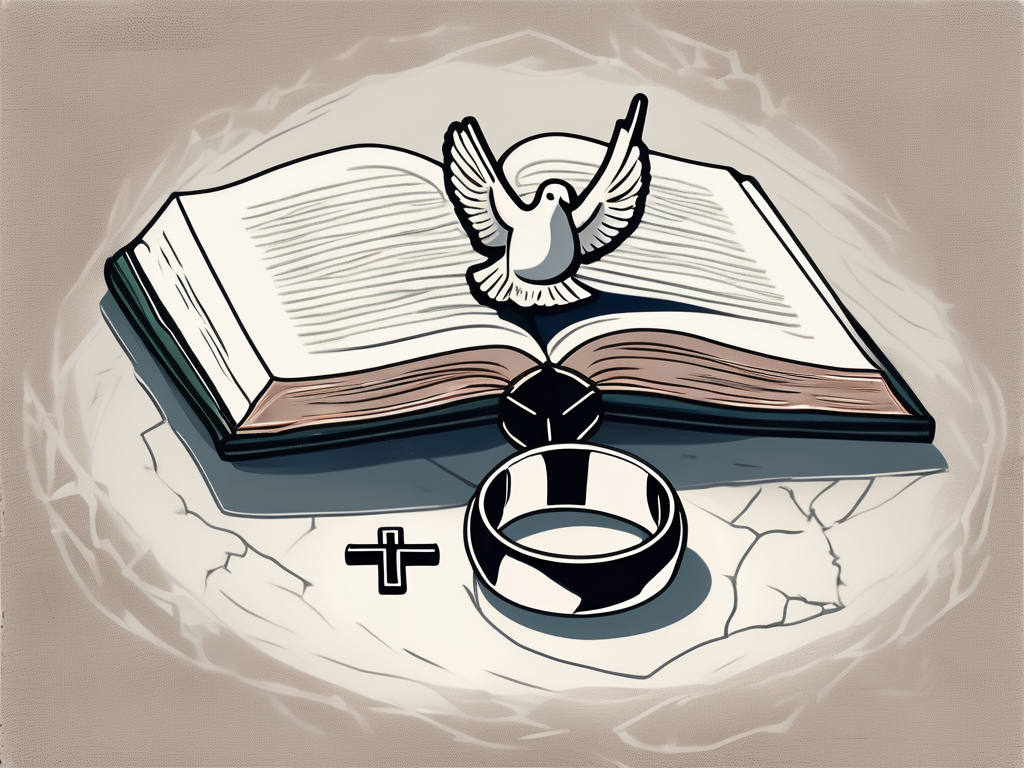Marriage is a topic that has been and continues to be of great importance to societies across the globe. It is a sacred union between a man and a woman, based on love, commitment, and mutual respect. But what does the Bible say about marriage? Let’s delve into the biblical perspective on this significant institution and explore its various aspects.
Understanding the Biblical Definition of Marriage
The Bible provides us with a clear definition of marriage as a covenant between a man and a woman. It is a bond that goes beyond a mere legal agreement or a social contract. In the book of Genesis, we find the very foundation of marriage: the story of Adam and Eve.
According to the Bible, God created Adam and then formed Eve out of Adam’s rib to be his companion and helper. This narrative establishes the idea that marriage is a union between a man and a woman, destined to support and complement each other in various aspects of life.
The Genesis of Marriage: Adam and Eve
In the story of Adam and Eve, we see that God designed marriage to be a lifelong commitment and a source of companionship. Adam recognized Eve as bone of his bones and flesh of his flesh, signifying their profound connection and oneness as husband and wife.
This biblical account teaches us that marriage is not a casual or temporary arrangement but rather a deep and intimate union designed by God himself.
Marriage as a Covenant: Biblical References
Throughout the Bible, we find numerous references to marriage as a sacred covenant. It is a solemn promise made between a man and a woman before God and witnesses, binding them together in love and fidelity.
One such reference can be found in the book of Malachi, where it is stated that God hates divorce because marriage is a covenant. This emphasizes the importance of upholding the commitment made in marriage and honoring the sacred bond between husband and wife.
Expanding further on the concept of marriage as a covenant, we can look at the example of Abraham and Sarah. In the book of Genesis, God made a covenant with Abraham, promising him descendants as numerous as the stars in the sky. Sarah, Abraham’s wife, played a crucial role in this covenant as she bore a son, Isaac, in her old age. Their marriage was not only a union of two individuals but also a partnership in God’s divine plan.
Another biblical reference that highlights the significance of marriage as a covenant is found in the New Testament. In the Gospel of Mark, Jesus affirms the divine intention of marriage by quoting from the book of Genesis: “But at the beginning of creation God ‘made them male and female.’ ‘For this reason, a man will leave his father and mother and be united to his wife, and the two will become one flesh.’ So they are no longer two, but one flesh” (Mark 10:6-8).
This passage reinforces the idea that marriage is not merely a human institution but a sacred union established by God Himself. It emphasizes the unity and oneness that marriage brings, as two individuals become united in heart, mind, and spirit.
Furthermore, the Apostle Paul, in his letter to the Ephesians, provides profound insights into the nature of marriage as a covenant. He compares the relationship between a husband and wife to the relationship between Christ and the Church, stating that husbands should love their wives just as Christ loved the Church and gave Himself up for her (Ephesians 5:25).
This analogy highlights the sacrificial love and selflessness that should characterize a marital relationship. It emphasizes the importance of mutual respect, support, and submission to one another, mirroring the love and devotion that Christ has for His Church.
In conclusion, the biblical definition of marriage is a covenant between a man and a woman, designed by God to be a lifelong commitment and a source of companionship. It is a sacred bond that should be honored and cherished, reflecting the love and unity that God intended for His creation.
The Roles and Responsibilities in a Biblical Marriage
In a biblical marriage, both partners have distinct roles and responsibilities. The Bible provides guidance on how husbands and wives should relate to each other, creating a harmonious and fulfilling relationship.
However, it is important to note that the roles and responsibilities in a biblical marriage are not meant to be rigid or oppressive. Instead, they are designed to foster love, respect, and unity between husband and wife.
Let’s delve deeper into the roles and responsibilities of both the husband and the wife, as outlined in the Bible.
The Role of the Husband According to the Bible
The Bible encourages husbands to love their wives sacrificially, just as Christ loved the church. This involves providing for their physical and emotional needs, leading with wisdom, and being a source of strength and support.
But what does it mean to love sacrificially? It means that husbands are called to put their wives’ needs above their own. They are to be selfless, compassionate, and understanding, always seeking to serve and uplift their wives.
Furthermore, husbands are called to exhibit servant leadership, placing the needs and well-being of their wives above their own. This requires humility, selflessness, and a commitment to nurturing a loving and respectful partnership.
It is important for husbands to understand that their role as the head of the household does not give them license to dominate or control their wives. Instead, it is a position of responsibility and servanthood, where they are called to lead with love and integrity.
The Role of the Wife According to the Bible
Similarly, the Bible outlines the role of the wife in a marriage. Wives are called to submit to their husbands, not in a subservient or demeaning manner, but out of reverence for Christ and mutual respect.
Submission in a biblical context means honoring and supporting the leadership of the husband, trusting his guidance, and working alongside him to build a strong and unified marriage. It is a cooperative partnership based on love and respect.
However, it is important to note that submission does not mean that wives are voiceless or powerless. On the contrary, they are encouraged to express their thoughts, feelings, and opinions in a respectful manner.
Wives are also called to be homemakers, creating a warm and nurturing environment for their families. This involves managing the household, caring for children, and supporting their husbands in their roles as providers and leaders.
Ultimately, the role of the wife in a biblical marriage is to be a helpmate, offering love, support, and encouragement to her husband, while also pursuing her own God-given passions and talents.
In conclusion, a biblical marriage is a partnership where both husband and wife have distinct roles and responsibilities. These roles are not meant to be oppressive or restrictive, but rather to foster love, respect, and unity. By embracing their roles with love and selflessness, husbands and wives can create a marriage that reflects the beauty and grace of God’s design.
The Bible’s View on Love and Respect in Marriage
Love and respect are essential components of a healthy and thriving marriage. The Bible offers valuable insights and guidance on cultivating these qualities within the marital relationship.
Marriage, as described in the Bible, is a sacred union between a man and a woman. It is a covenant that requires love and respect to flourish and thrive. The Bible provides us with key verses that shed light on the significance of love and respect in a marriage, guiding us towards building a strong and fulfilling relationship.
Love in Marriage: Key Bible Verses
The Bible is replete with verses that highlight the significance of love in marriage. One such verse is found in 1 Corinthians 13:4-7, where it describes love as patient, kind, not envious, not proud, not self-seeking, not easily angered, and enduring all things.
This passage exemplifies the selfless and unconditional love that should characterize a biblical marriage, fostering a deep bond and creating an environment of love and acceptance. It reminds us that love is not just a feeling, but a choice and an action. It requires us to be patient and kind, to put aside our own desires and needs, and to be willing to endure hardships together.
Another verse that emphasizes the importance of love in marriage is found in Ephesians 5:25, which states, “Husbands, love your wives, just as Christ loved the church and gave himself up for her.” This verse reminds husbands of their responsibility to sacrificially love their wives, mirroring the love that Christ has for the church.
Love in a biblical marriage is not self-centered or conditional. It is sacrificial, selfless, and seeks the best for one’s spouse. It involves actively pursuing the well-being and happiness of the other person, even when it requires personal sacrifice.
The Importance of Respect in a Biblical Marriage
Respect is equally crucial in a biblical marriage. Ephesians 5:33 states, “Let the wife see that she respects her husband.” Respect goes beyond mere admiration; it involves recognizing the value and worth of one’s spouse and appreciating their unique strengths and contributions.
Respect in a marriage means treating each other with honor, dignity, and consideration. It means valuing each other’s opinions, listening attentively, and seeking to understand one another. It involves speaking words of affirmation and encouragement, building each other up rather than tearing each other down.
When both partners show love and respect to one another, it nurtures a sense of security, honor, and appreciation within the marriage, promoting unity and harmony. It creates an atmosphere where both spouses feel valued, understood, and supported.
Respect also means recognizing and appreciating the God-given roles and responsibilities within marriage. It involves husbands lovingly leading their families and wives willingly submitting to their husbands’ leadership, as outlined in Ephesians 5:22-24. This submission is not about inferiority or dominance, but about working together in unity, with mutual love and respect.
In conclusion, the Bible’s view on love and respect in marriage is clear. Love and respect are not optional extras, but foundational principles that are essential for a thriving and fulfilling marital relationship. By following the guidance and wisdom found in the Bible, couples can cultivate a love that is selfless, sacrificial, and enduring, and a respect that is honoring, appreciative, and supportive.
The Sanctity of Marriage in the Bible
The Bible upholds the sanctity of marriage and provides guidance on various issues that can arise within a marital relationship. Let’s explore two significant aspects: adultery and divorce.
The Bible’s Stance on Adultery
Adultery, the act of being unfaithful to one’s spouse, is seen as a serious violation of the marital covenant in the Bible. It is condemned and described as an ultimate betrayal of trust and commitment.
In various passages, such as Exodus 20:14 and Matthew 5:27-28, the Bible emphasizes the importance of faithfulness and calls for purity and loyalty within the marital relationship.
Divorce and Remarriage: What Does the Bible Say?
The topic of divorce is a complex one and has been the subject of interpretation and debate. The Bible acknowledges that, due to human brokenness and the fallen nature of the world, divorce can occur. However, it also emphasizes the importance of reconciliation and working towards the restoration of the marriage.
Jesus, in Matthew 19:8-9, clarifies that the permission for divorce granted in the Old Testament was due to the hardness of people’s hearts, but from the beginning, it was not so. He states that divorce should only occur in cases of sexual immorality, and even then, reconciliation should be pursued whenever possible.
The Bible’s Guidance for a Successful Marriage
Lastly, the Bible offers practical guidance for cultivating a successful and fulfilling marital relationship. Two essential aspects are communication and forgiveness, along with the role of faith and prayer.
Communication and Forgiveness in a Biblical Marriage
Effective communication is vital in any relationship, and marriage is no exception. The Bible encourages open and honest communication, speaking truth in love, and resolving conflicts in a respectful and gracious manner.
Forgiveness is equally crucial, as no marriage is without its challenges and mistakes. The Bible teaches forgiveness as an essential aspect of love, urging couples to forgive one another just as God forgives us.
The Role of Faith and Prayer in a Biblical Marriage
Faith and prayer play a significant role in a biblical marriage. The Bible encourages couples to build their relationship on a foundation of faith in God, seeking His guidance and wisdom in all aspects of their union.
Prayer can be a powerful tool in strengthening a marital relationship, fostering a deep connection with God and each other. Couples are encouraged to pray together, seeking God’s help, and surrendering their desires, fears, and worries to Him.
In conclusion, the Bible provides valuable insights and principles for a healthy and successful marriage. It emphasizes the sacredness of the marital covenant, the roles and responsibilities of both husband and wife, the importance of love and respect, and the need for effective communication, forgiveness, and faith. By embracing these biblical teachings, couples can build a strong and lasting marriage that honors God and brings joy and fulfillment to their lives.












